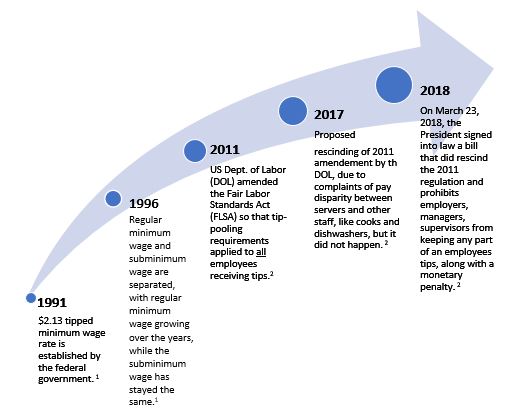Understanding TIP Credits, Pooling, Sharing

March 23, 2018 saw the signing by President Trump of a new bill into law that addressed multiple spending areas, one of which was “a plan to scale back the administration’s proposed tip pooling regulation from late 2017.” The bill did rescind the 2011 regulation that prohibited tipped employees from sharing with non-tipped employees, but only when an employer pays his/her tipped employees full minimum wage. Tipped employees who are paid at least the prevailing minimum wage can now legally share their tips with non-tipped employees. The bill also stipulates that employers, managers, supervisors, etc., cannot collect or retain tips earned by employees.2
To better understand Tip Credits, Tip Pooling and Tip Sharing, each is discussed below, along with a timeline illustrating the inception of the Tip Credit through the current legislation.
Tip Credits
Ever since legislation was first passed that allowed employers to obtain Tip Credits in relation to paying their tipped employees full minimum wage, there has been controversy and litigation. The Tip Credit meant that employers could now be exempt from paying full minimum wage to these tipped employees. Instead, a subminimum wage of $2.13* per hour was established to combine with the tips an employee would receive during their workweek. If the employee received a combined tip + subminimum wage that equaled the prevailing minimum wage or over, the employer did not have to pay anything more. If, however, the combined tip + subminimum wage came in under the prevailing minimum wage, the employer had to make up the difference. The difference between the prevailing minimum wage and the subminimum wage for a particular state is the Tip Credit. *Some states have done away with the $2.13 subminimum wage rate, thus ensuring their tipped employees always receive at least the full prevailing minimum wage.
Tip Pooling
When all the tips are collected from the employees who regularly receive tips and put into one “pool,” then redistributed equally among the larger group of employees, who contribute to the overall service to the consumer, but are not tipped employees, it is known as Tip Pooling.
Tip Sharing
Different than Tip Pooling, Tip Sharing or “Tipping-Out,” as it is known, is when a predetermined percentage of all tips, sales, other receipts are shared with support staff apart from those who are participants in the “pool.”
Summary
Ongoing litigation between employers and disgruntled employees is likely to continue, until a better way to handle tipped employees is enacted. To support that, consider that between 2010 and 2012, the Department of Labor investigated 9,000 restaurants and found a violation rate of 80% among those restaurants. 1 Violations most likely were the result of employees not being paid at least minimum wage. Over the years, different states have tackled this issue by increasing the subminimum wage rate for their state’s tipped employees. Seven states (AK, CA, MN, MT, NV, OR, WA) have gone so far as to require employers in those states to pay their tipped employees the full prevailing minimum wage rate before tips.3
To learn more about the newest legislation regarding Tip Pooling, the Department of Labor has produced a new Fact Sheet (#15). Click here to read Fact Sheet #15: https://www.dol.gov/whd/regs/compliance/whdfs15.pdf
Until next month!
Carol Schoff
Director of HR & Benefits
1 https://www.epi.org/publication/waiting-for-change-tipped-minimum-wage/
2 https://www.govdocs.com/new-federal-spending-law-scales-back-proposed-regulation-change-on-tip-pooling
3 https://www.dol.gov/whd/state/tipped.htm




